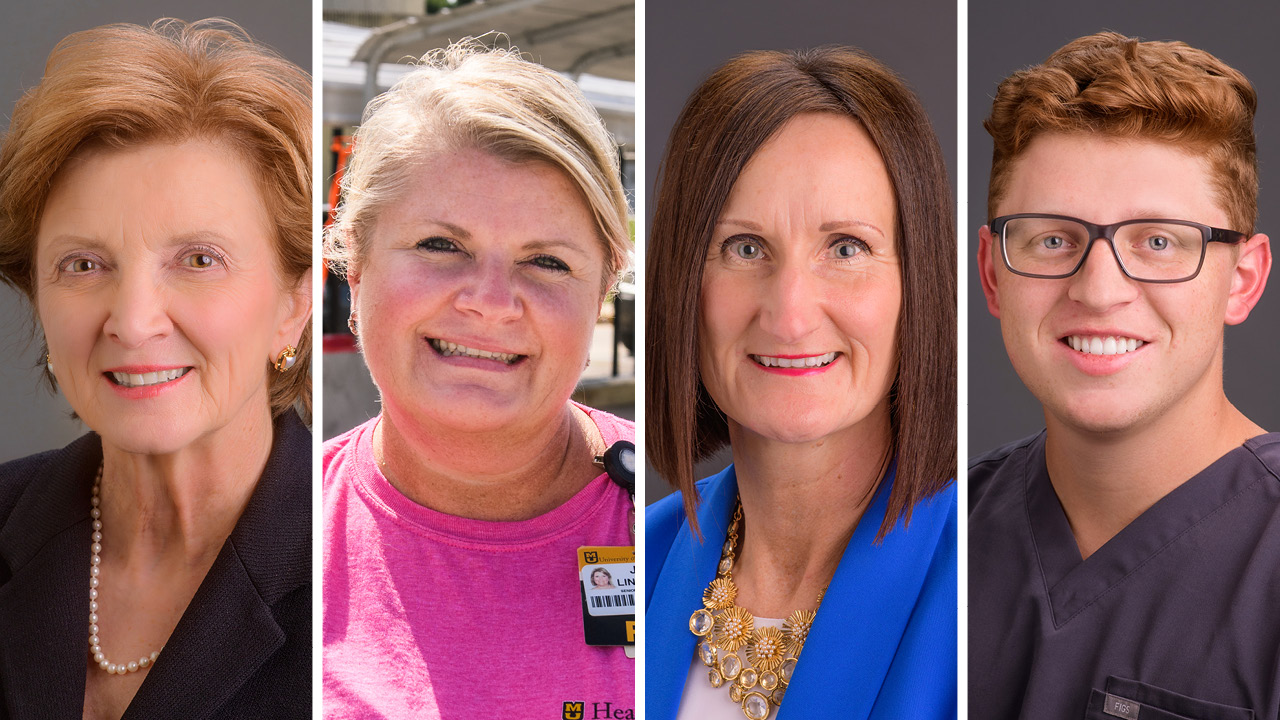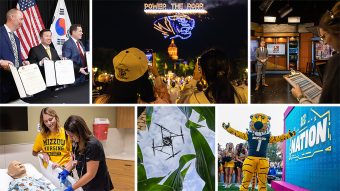
Aug. 12, 2021
As the region’s only academic health system, MU Health Care treats the simplest and most complex medical conditions — including COVID-19. The arrival of the coronavirus pandemic shifted job responsibilities and protocols and made an already demanding profession tougher.
“I’ve been a nurse 44 years, and this has been the most challenging situation I’ve experienced in my career,” said Mary Beck, who retired as MU Health Care’s chief nursing officer on Aug. 6.
The greatest challenge was met with innovation, preparation and compassion. Here are the stories of four nurses — all of them graduates of MU’s Sinclair School of Nursing — who have played key roles in MU Health Care’s pandemic response, from administrative planning to testing to vaccinations to direct patient care. Learn about a few of these Tigers who have made a difference for our community.
Incident commander
On March 12, 2020, MU Health Care established a COVID-19 incident command. Beck and chief medical officer Steve Whitt were selected as co-incident commanders. They faced a challenge of staggering complexity. The task required essentially setting up a hospital within a hospital by establishing isolated areas to test, admit and care for patients with COVID-19 while still providing necessary health care to uninfected patients. They had to make these plans in an environment in which little was known about how the virus was transmitted, how hard it would strike Missouri or whether the health system’s supply of personal protective equipment (PPE) would be restocked regularly.
Despite changing conditions and numerous challenges, Beck said she was inspired by the resilience of the employees she leads. “What’s most rewarding to me is the way the staff of MU Health Care pulled together and said, ‘We’re going to do our very best work and continue to provide excellent care to all who seek to come here,’ even when they’re being challenged on a personal level,” Beck said. “We’ve problem-solved together and supported each other.”
Going mobile
Beginning in March 2020, Jeanette Linebaugh was not just MU Health Care’s senior director of nursing for ambulatory care services, she was also the manager of the drive-thru testing site located next to the MU softball stadium — a site that was built from scratch in just two days.
“In nursing school, we were taught to think through workflows and what they looked like from a patient perspective and from a staff perspective,” Linebaugh said. “I drew on my abilities to critically think and be innovative on how to serve the community.”
Because of increased patient volume — as many as 700 people were tested in one day —Linebaugh again took a leadership role. She helped organize the high-throughput vaccine site at Faurot Field that was able to give thousands of shots per day to the public.
“Serving the community during the pandemic has been one of the most humbling experiences in my nursing career,” Linebaugh said. “When members of the community enter the doors of the Columns Club at Faurot Field, I see hope in their eyes — hope for a better tomorrow, a tomorrow where they can see their grandchildren, friends and loved ones without fear of getting sick.”
(The Faurot Field vaccination site closed in June, and vaccinations are now available in select clinics and pharmacies. Learn more.)
Together at a distance
When the pandemic arrived in Missouri, Debra Deeken, executive director of clinical operations and director of nursing for the Missouri Psychiatric Center, knew her team would have to make adjustments to continue to serve their patients.
“We looked at every single process we had and had to think through ways to mitigate infection risks in everything we do,” Deeken said. “There was an incredible amount of effort put into place to keep our patients and staff safe from COVID-19.”
Deeken gained a new appreciation for the importance of over-communicating with her nurses and staff, not just about all the changing procedures they needed to follow, but also about their personal stress and struggles.
“My clinical knowledge and leadership education help me work through processes, pull people together, initiate change and follow through on that change,” Deeken said.
Compassion in the MICU
TJ Headley, a 2018 Sinclair School of Nursing graduate, was used to serving the sickest patients in the medical intensive care unit (MICU), but his job had a new twist during the pandemic — connecting patients with the loved ones who couldn’t visit them.
“That’s hard on the patient and hard on the family members,” Headley said. “We’ve done our best to make sure they can see their loved one, even if it’s through Zoom on an iPad, and to see we’re caring for them and doing everything we can. Some nurses will take care of a patient for two or three weeks in a row. They’re sick for a very long time, and family members call every night, and we kind of get to know them.”



